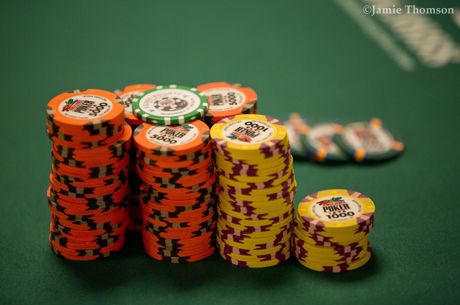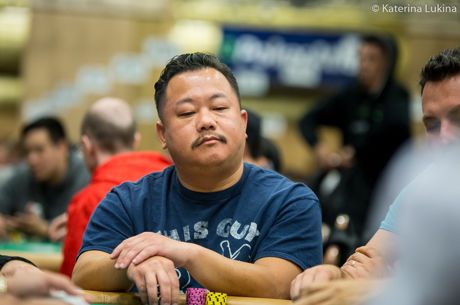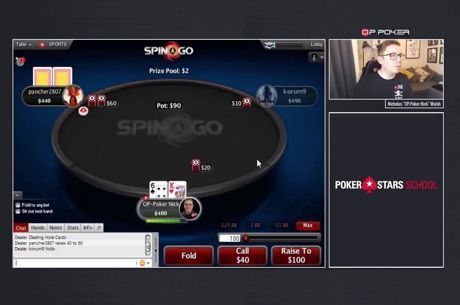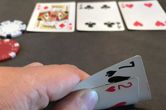Do You Suffer From Poker Traumatic Stress Disorder?
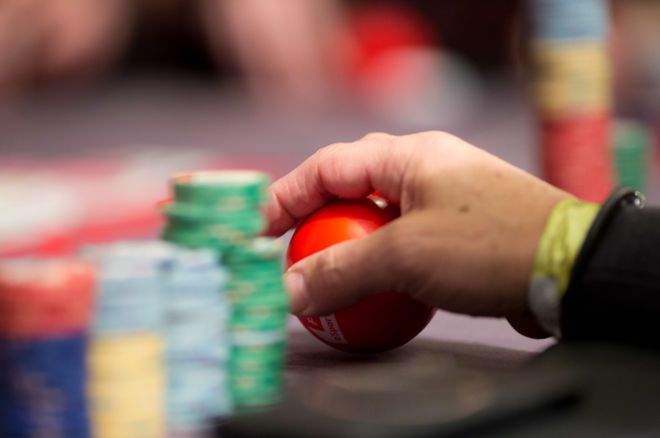
Flashbacks... nightmares... anxiety... difficulty coping... trouble completing normal daily tasks... avoidance... emotional numbness... anger....
Do you keep waking up in the afternoon with these recurring symptoms? You may be suffering from "Poker Traumatic Stress Disorder" (PTSD).
To illustrate the parallels to actual PTSD �� that is, Post Traumatic Stress Disorder, a serious psychiatric malady that emerges after exposure to traumatic events �� check out this quote from the American Psychiatric Association:
"People with PTSD have intense, disturbing thoughts and feelings related to their experience that last long after the traumatic event has ended. They may relive the event through flashbacks or nightmares; they may feel sadness, fear or anger; and they may feel detached or estranged from other people."
Not to diminish the consequences or effects of actual war, but for some the poker table can occasionally feel something like a war zone, an experience that can leave its own kind of traumatic stress in its wake.
I wrote my first poker blog post after busting at a tournament final table when my pocket aces flopped set-over-set, then lost to quads on the river. That was October 12, 2012. It's 2,469 days later, and I'm retelling the same sad story. I'm not over it yet.
The Gap
There's a gap that starts to form between your better judgment and the actual choices you make when under the stress of combat.
You sit among your enemies trying to deceive them, outsmart them, and bludgeon them, while they attempt the same. As the game unfolds, each poker hand is a battle, each session a military campaign. Most battles you quickly avoid. Some you win, other times the enemy forces you to fold or suffer casualties.
Inevitably something goes wrong, causing stress. Another stressor happens. Then another. You know these stressors. Bad beats, coolers, suckouts, missed draws, their draws hit, getting value-owned, failed bluffs, failed hero calls, idiot calling stations, assholes, it's freezing in here, that hand you wanted to play but didn't because of your so-called better judgment and you would have flopped a monster and dragged the biggest pot of the night....
Losing is painful. You can see your chips going into the enemy's stack. Less visible are the injuries to your emotional state, which raise the risk of rushed or sloppy decisions.
You make at least one decision every hand, and any decision other than folding means there will be at least one more. Perhaps 400-1,000 decisions per session? Each time you take an action that tomorrow, in hindsight, will have been both wrong and preventable, you sink deeper into that gap between your combat strategy and your spontaneous actions.
Tipping Points
At some tipping point, such stress can become traumatic. You feel a flush of anger across your face. From your lips flows sarcasm or profanity. You think about revenge, not ranges. Entitlement, injustice, and rage kick in. The gap becomes a canyon. You are like the proverbial frog in a pot of water, unaware of the danger until it's too late.
War is hell. It is none of your fantasies and all of your nightmares.
At another tipping point, the symptoms persist and traumatic stress becomes a disorder. Session after session, everything is going fine �� until it isn't, and your bankroll is decimated by friendly fire. Flashbacks... nightmares... you have Poker Traumatic Stress Disorder.
Predetermine Your Better Judgment
Your better judgment is whatever you believe is the right thing to do in a given spot, when you can evaluate it from all sides. Find time when you can be free from stress, perhaps at home with a cup of tea after a good night's sleep and long meditation. Under perfect contemplation conditions, reason can triumph over emotion.
To narrow the gap, identify those spots where you can predetermine your better judgment. Then commit those better judgments to memory, whether that leads to knowing preflop auto-fold ranges or following rules like "never raise with naked flush draws unless the right conditions exist," or player-specific guidelines like "George only shoves all in on the river with the absolute nuts." This is how to prepare for the next war.
When you find yourself wondering "Why did I do that? I know better," see it as a sign that you need to sit out a round or two to get back into your better judgment zone. Whether it's a simple bathroom break, a few minutes of walking or stretching, phoning a friend for the airing of grievances, or cashing out early and calling it a day, preventing poker stress from becoming a traumatic disorder is a bankroll-saver.
Follow this advice, and in the future perhaps for you PTSD will stand for Poker Teaches Self-Discipline.
David Bass mostly plays in live no-limit hold��em cash games and has been writing about poker since 2012. You can follow him on Twitter @KKingDavidPoker or enjoy his blog, They Always Have It, at https://kkingdavid.com/.
Photo: "Stress ball," World Poker Tour, CC BY-ND 2.0.

